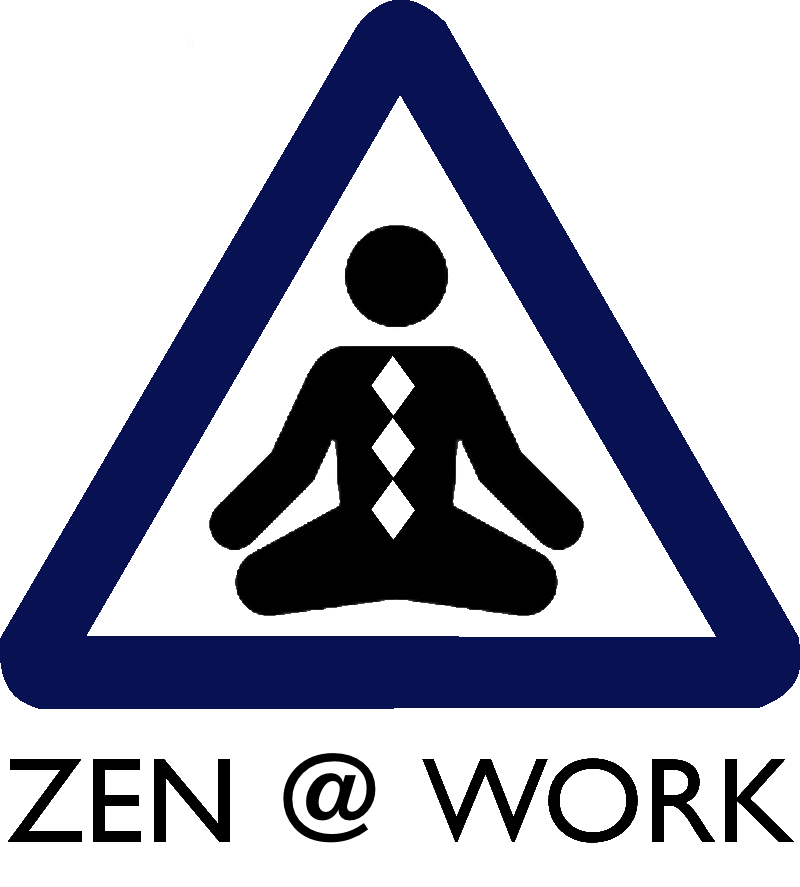Zen and Work
What Is Zen?
The word “Zen” just means “meditation.” In Zen@Work, I refer specifically to practices that allow you to develop your Whole Self, with its intrinsic equanimity, resilience, clarity and power. These intrinsic qualities are uniquely challenged in today’s workplace, but they offer the promise of greater thriving for all, regardless of one’s work-in-the-world.
Zen incorporates traditional Mindfulness practices, and yields all the benefits increasingly coming to light in the West. It goes deeper by locating the sources of mental distress in a lack of inner wholeness, and directing practices accordingly.
We apply several core principles of Zen in this work:
“Nothing Extra” Our minds are constantly receiving thoughts, feelings and sensations, which interact with stored memory. We attempt to understand, function along with (and control) this amazingly rich sensorium by adding reactive layers of judgement and commentary. The “extra” layers weave a tapestry that creates false stories about ourselves and the world. The false stories in turn subvert our ability to be and act wholeheartedly. Applying directed non-judgmental awareness to false stories allows them to dissolve, opening the space for radiant intelligence and feeling.
Body and Mind are not Separate Our physical, emotional and mental processes are intimately connected. When we become aware of how they are working together, we benefit from their collective power. When we are not aware, they often fall out of alignment, and the resulting inner conflicts produce confusion, fatigue and poor judgment, as well as compensatory and coping mechanisms that further exacerbate the situation. To grow this awareness, we check in with our three intelligences: head, heart and gut. When we ask them about a specific decision (e.g. “should I invest my resources in this project or person?”) they may in fact give different answers. When we are aware of the differing answers, it is merely disagreement. But if we are not aware, or don’t accept it, then there is conflict and inner disturbance. Zen at Work transforms inner conflict into empowered action. The Chinese word Xin (pronounced “Shin”) refers to “Body-Mind” or “Heart-Mind”. Modern biology has verified the reality of Xin by discovering neurons in the heart and the gut. When we bring Xin alive, it informs all our work-in-the-world, reaping the bounties of insight, wisdom and compassion.
“Not Knowing is Most Intimate” Oftentimes, what we think we know keeps us from seeing the path forward. As Albert Einstein famously said, “No problem can be solved from the same level of consciousness that created it.” Our knowing mind discovers (or creates) the problems, but it is up to our intuitive minds to unlock the resolutions. Nothing in life is random. Everything is a result of discrete causes, and has the potential for supporting our growth. But the Knowing Mind does not have access to the infinite field of causation, so becomes fixated on the personal dramas of “Good News/Bad News”, which in turn reinforces a false view of reality, including a false sense of Self. The mind of Not Knowing is not the same as being ignorant! With the mind of Not Knowing, we can hold an immense amount of information, and allow more to enter. By changing our relationship to what we (think we) know, we open new space. But it takes practice to trust the mind of Not Knowing.
What is Work?
Work is what you do in the world every day. It is the “doing” that connects you with society, community and culture.
Work is more expansive than job or career. Everyone works: young and old, wealthy and poor, retired, employed or financially independent, manual workers and knowledge workers.
There are three “sacred vows” in life: with Self, with Other, and with Work. The vow to Self involves your deepest nature and purpose. The vow to Other involves your deepest relationships with partner, family and intimates. The vow with Work involves your essential relationship with society, community and world, which is typically all your “doing” that lies outside the first two vows.
In earlier phases of human civilization, composed of much smaller social units, the three vows overlapped and could be served together. In our ever more stratified and complicated society, these domains have grown apart. It is difficult to maintain integrity in all three at once, and in fact we can spend many years deepening our commitments in one, while one or both of the others goes lacking. Work has also become more specialized, and organizations much larger, which can obscure our Work’s sacred nature by attenuating the distance between what we do and how it affects others. Our accelerating addictions to busy-ness and disproportionate growth further cloud our sacred work.
Nevertheless, when we bring our Whole Self alive, we can serve all three vows simultaneously by bringing to consciousness how they are operating in our life. This is a deeper process than setting priorities and making compromises. By recognizing the fundamental unity of your life, it invites you to live wholeheartedly no matter what you are doing.
Founders, Executives and Mission-driven individuals are called to work in leadership and caregiving capacities that especially challenge their ability to maintain integrity and alignment. Oftentimes, those who have had success in their fields must also re-align their purpose and re-source their inspiration to reflect their own maturity and learnings.


